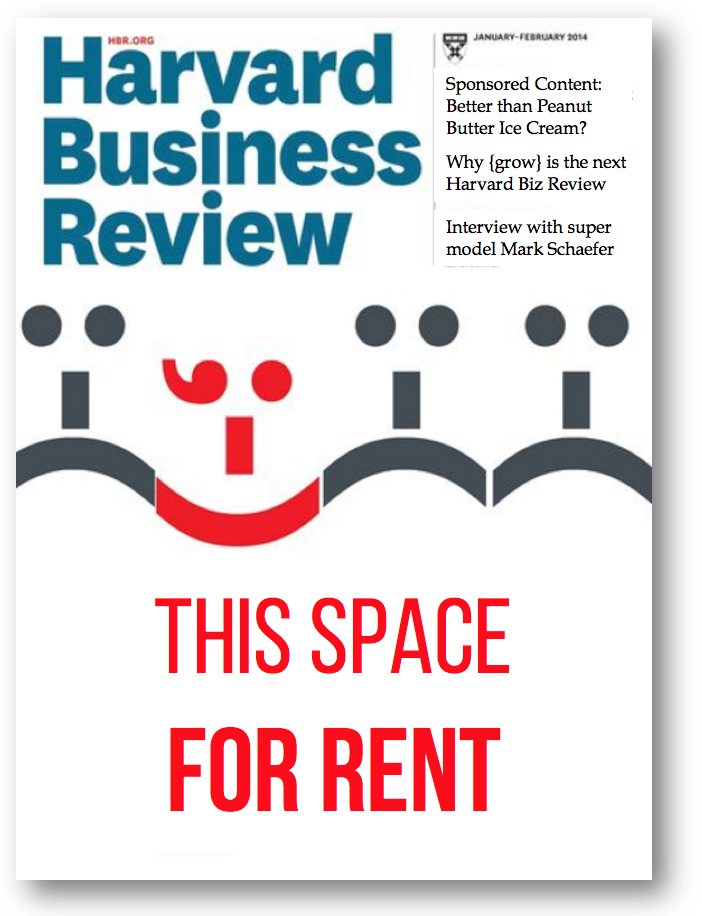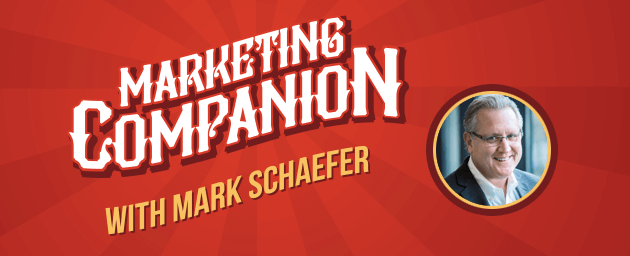
For more than two decades, I have read The Harvard Business Review. It has attracted some of the greatest business writers in history. Many articles from this venerable publication have produced classic ideas that are standard reading in university classes. In 2015, I achieved a long-time personal goal by becoming a contributor to the publication.
This is an institution I love. This is a publication I trust. But it all came crashing down this week when I saw two little words under one of their new posts: “sponsored content.”
Many business leaders dream of being at a point in their lives when they would be recognized by the HBR and invited to add to their canon of business writing. And now some sponsor was able to sneak on to campus simply by handing HBR a couple thousand bucks.
It seemed cheap and creepy. To me, this would was like walking into a showroom for Maserati and seeing a bumper sticker that says “Like Us On Facebook!” You just don’t do that.
But how is sponsored content different from taking money for an ad? Why does this seem so disgusting? I began to reflect on why this produced such a reaction, and the unintended risk of sponsored content.
Sponsored content on the rise
“Sponsored content” has a variety of meanings but most marketers agree that it’s part of this new category of native advertising. My friends at The Interactive Advertising Bureau in New York define this as “paid ads that are so cohesive with the page content, assimilated into the design, and consistent with the platform behavior that the viewer simply feels that they belong.”
While this idea is not new (think “special advertising section” in a magazine) the most effective sponsored content today is seamlessly integrated into the editorial section, in many cases indistinguishable from the “real” content.
And this has become a HUGE business.
According to a new report by DigitalRelevance, about three quarters of publishers and media buyers are now featuring sponsored articles. The reasons are compelling:
- 25 percent more consumers looked at sponsored articles than display ad units
- Sponsored content produces 18 percent higher lift in purchase intent and 9 percent higher lift for brand affinity than banner ads.
- Native advertising spend is expected to more than quadruple by 2018.
For publishers, this means a new, reliable, and growing revenue channel. For brands, this provides a creative new way to influence prospects early in the buyer’s journey.
But what does it mean for CONSUMERS?
The psychology of sponsored content
Last week I was reading a post from one of my favorite bloggers. In fact, I have read his blog religiously for five years. The post included a suspicious number of positive references to a social analytics company and I thought, “Wow, they must have paid him to write this.”
Sure enough, at the bottom of the post he disclosed that the analytics company was a client. I felt betrayed. I just spent 10 minutes reading what amounted to an advertisement. I trusted this blogger but felt I had been lured into a trap. Do I need to examine every post he writes now to determine if somebody paid him off?
In the span of one moment, this trusted blogger, and The Harvard Business Review, breached a connection of trust that had taken years to establish with me.
And this, my friends, is the core idea you need to thoroughly explore before committing to a path of sponsored content: Are you willing to exchange trust for money?
The essential element
When doing research for my book The Content Code, I interviewed more than 50 business leaders to determine their source of power on the web. What was that essential element that propelled them to the top, that made their content soar above the rest?
There were several themes that emerged — congruency, work ethic, and compassion, to name a few. But there was one word used by every single business leader: TRUST. Never, ever, jeopardize trust.
It provokes an interesting question: What is the economic value of trust? Is trust an absolute or it possible to give up just a little for some financial gain? With other forms of advertising under attack, do we have any choice but to go this route?
Staying the course of cool
I have an inspiring 25-year-old friend in Brooklyn who is immersed in the start-up world. After a couple mis-fires, he found success with a new site that provides original content for urban Millennials.
By delivering edgy and helpful posts from a staff of paid writers, his business is attracting millions of page views each month from an audience that is highly desirable to advertisers. As he considers options for monetization, my friend is thinking about taking a leap into sponsored content and has a liquor company and a mattress company lined up and ready to go.
But here’s the risk. He has built his brand by being the coolest of the cool. Once he starts salting in content that is paid by sponsors, is he crossing that line of trust in a way that puts his entire brand at risk? Does his audience really want to see well-written posts about mattresses?
I showed him an example of a site that moved from original content to primarily sponsored content and it lost 90 percent of its readership in 24 months.
If sponsored content drives readers away, your ability to charge advertisers is jeopardized too. Kind of a vicious circle, right?
But what if he leveraged TRUST as the strategy? What if he declared a “sponsored content free zone” and monetized by attracting great companies to pay for cool events and other sponsorship options? What if he turned his millennial expertise toward helping brands create their own content for this market?
It’s a very difficult decision. After several years of being broke, the idea of fast money through sponsored content is intoxicating to my friend. Short term money. Long term brand. Tough decisions.
Is trust worth $100,000?
 When others run toward the fast money by renting out their trust, does it make sense to stay the course of cool? Isn’t there an extraordinary value to the idea of unimpeachable trust?
When others run toward the fast money by renting out their trust, does it make sense to stay the course of cool? Isn’t there an extraordinary value to the idea of unimpeachable trust?
I have a great friend who has a keen sense of the economic value of trust. I met Ana Silva O’Reilly in 2012 and encouraged her to turn her passion for travel into a blog and a business. She has excelled at this and was recently named the top travel blogger in the UK.
Obviously many companies would love to buy space on her blog! But Ana had other ideas.
“I could have made over $100,000 on sponsored content if I had said yes and published a lot of crap,” she said. “In fact, the ‘outreach managers’ for these brands are taken aback when I turn down money for their content! But by building an audience based on trust, I’m now in a position where I can work as a blogger with brands that I love like American Express and British Airways. I have an engaged audience because I have their trust. What is that worth? To me, everything.”
Where do we go from here?
I recently saw a quote claiming that you have a higher probability of being a survivor of an airplane crash than clicking on a banner ad. The point is, traditional methods of monetization are fading away and in many cases sponsored content may be the best and only option to fund your business.
Do you make this leap? Here are some strategic considerations:
- Where do you fit in the competitive eco-system? If you sell your trust does it open the door for a competitor to become the coolest of the cool in your market?
- What is the long-term versus short-term strategy? As Ana demonstrated, her view of the long-term allowed her to build an engaged audience based on trust. That became more valuable than the short-term sponsored content revenue.
- Is it possible for sponsors to create content even more valuable than what you have now? Could you use the resources of a larger partner to your advantage in some way?
- Who owns editorial control? Are sponsors willing to stick to strict quality guidelines?
- Are you willing to provide an obvious disclosure that is appropriate to your audience? For example, if my blogger friend had established at the top of the article that this was a client, I would have had a choice to skip it.
- Will sponsored content eventually become accepted as the “price of business” with your readers? We have been conditioned to expect ads. Will we eventually be conditioned to accept sponsored content?
This is certainly a dynamic and emotional issue. What do you think? Is trading on trust an inevitable part of the web’s future?
Note: One of the ways I am keeping {grow} a sponsored content free zone is by encouraging readers to become patrons of the blog. For as little as $5 month you can show your appreciation of the content on {grow} and also gain access to behind the scenes information and insights. For more information, click here.


